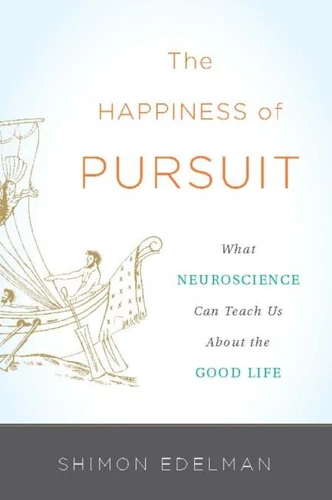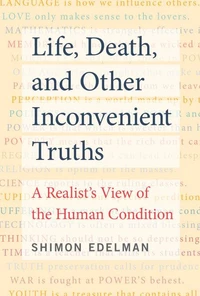The Happiness of Pursuit. What Neuroscience Can Teach Us About the Good Life
Par :Formats :
Disponible dans votre compte client Decitre ou Furet du Nord dès validation de votre commande. Le format ePub protégé est :
- Compatible avec une lecture sur My Vivlio (smartphone, tablette, ordinateur)
- Compatible avec une lecture sur liseuses Vivlio
- Pour les liseuses autres que Vivlio, vous devez utiliser le logiciel Adobe Digital Edition. Non compatible avec la lecture sur les liseuses Kindle, Remarkable et Sony
- Non compatible avec un achat hors France métropolitaine
 , qui est-ce ?
, qui est-ce ?Notre partenaire de plateforme de lecture numérique où vous retrouverez l'ensemble de vos ebooks gratuitement
Pour en savoir plus sur nos ebooks, consultez notre aide en ligne ici
- Nombre de pages240
- FormatePub
- ISBN978-0-465-02920-4
- EAN9780465029204
- Date de parution30/01/2012
- Protection num.Adobe DRM
- Infos supplémentairesepub
- ÉditeurBasic Books
Résumé
When fishing for happiness, catch and release. Remember these seven words -- they are the keys to being happy. So says Shimon Edelman, an expert on psychology and the mind. In The Happiness of Pursuit, Edelman offers a fundamental understanding of pleasure and joy via the brain. Using the concept of the mind as a computing device, he unpacks how the human brain is highly active, involved in patterned networks, and constantly learning from experience.
As our brains predict the future through pursuit of experience, we are rewarded both in real time and in the long run. Essentially, as Edelman discovers, it's the journey, rather than the destination, that matters. The idea that cognition is computation -- the brain is a machine -- is nothing new of course. But, as Edelman argues, the mind is actually a bundle of ongoing computations, essentially, the brain being one of many possible substrates that can support them.
Edelman makes the case for these claims by constructing a conceptual toolbox that offers readers a glimpse of the computations underlying the mind's faculties: perception, motivation and emotions, action, memory, thinking, social cognition, learning and language. It is this collection of tools that enables us to discover how and why happiness happens. An informative, accessible, and witty tour of the mind, The Happiness of Pursuit offers insights to a thorough understanding of what minds are, how they relate to each other and to the world, and how we can make the best of it all.
As our brains predict the future through pursuit of experience, we are rewarded both in real time and in the long run. Essentially, as Edelman discovers, it's the journey, rather than the destination, that matters. The idea that cognition is computation -- the brain is a machine -- is nothing new of course. But, as Edelman argues, the mind is actually a bundle of ongoing computations, essentially, the brain being one of many possible substrates that can support them.
Edelman makes the case for these claims by constructing a conceptual toolbox that offers readers a glimpse of the computations underlying the mind's faculties: perception, motivation and emotions, action, memory, thinking, social cognition, learning and language. It is this collection of tools that enables us to discover how and why happiness happens. An informative, accessible, and witty tour of the mind, The Happiness of Pursuit offers insights to a thorough understanding of what minds are, how they relate to each other and to the world, and how we can make the best of it all.
When fishing for happiness, catch and release. Remember these seven words -- they are the keys to being happy. So says Shimon Edelman, an expert on psychology and the mind. In The Happiness of Pursuit, Edelman offers a fundamental understanding of pleasure and joy via the brain. Using the concept of the mind as a computing device, he unpacks how the human brain is highly active, involved in patterned networks, and constantly learning from experience.
As our brains predict the future through pursuit of experience, we are rewarded both in real time and in the long run. Essentially, as Edelman discovers, it's the journey, rather than the destination, that matters. The idea that cognition is computation -- the brain is a machine -- is nothing new of course. But, as Edelman argues, the mind is actually a bundle of ongoing computations, essentially, the brain being one of many possible substrates that can support them.
Edelman makes the case for these claims by constructing a conceptual toolbox that offers readers a glimpse of the computations underlying the mind's faculties: perception, motivation and emotions, action, memory, thinking, social cognition, learning and language. It is this collection of tools that enables us to discover how and why happiness happens. An informative, accessible, and witty tour of the mind, The Happiness of Pursuit offers insights to a thorough understanding of what minds are, how they relate to each other and to the world, and how we can make the best of it all.
As our brains predict the future through pursuit of experience, we are rewarded both in real time and in the long run. Essentially, as Edelman discovers, it's the journey, rather than the destination, that matters. The idea that cognition is computation -- the brain is a machine -- is nothing new of course. But, as Edelman argues, the mind is actually a bundle of ongoing computations, essentially, the brain being one of many possible substrates that can support them.
Edelman makes the case for these claims by constructing a conceptual toolbox that offers readers a glimpse of the computations underlying the mind's faculties: perception, motivation and emotions, action, memory, thinking, social cognition, learning and language. It is this collection of tools that enables us to discover how and why happiness happens. An informative, accessible, and witty tour of the mind, The Happiness of Pursuit offers insights to a thorough understanding of what minds are, how they relate to each other and to the world, and how we can make the best of it all.




